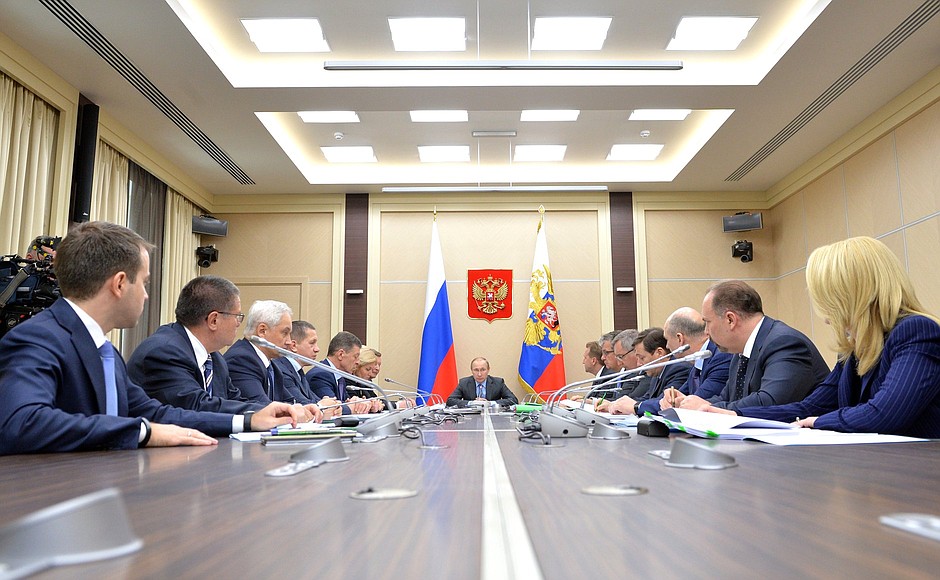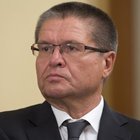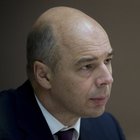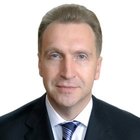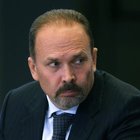The subjects on the agenda included priority draft laws to improve the business climate. The meeting participants also examined the transition to new procedures for payment of property tax based on cadastral value.
* * *
President of Russia Vladimir Putin: Colleagues,
Today, we will hear from the Economic Development Minister, Mr Ulyukayev, on the laws we consider priorities and which we want to see passed during the first half of the year, during the spring session. These laws aim to improve the business climate.
This is a very important matter and one that we have been working on consistently and systematically. Let’s start though with a few current matters. I would like to say a few words to the Finance Minister and the Economic Development Minister on the subject of real estate and land valuation. This issue continues to preoccupy many people, businesspeople and ordinary citizens.
First of all, people are concerned about the cadastral valuation method. They say it is often higher than the market value. I know the Government is currently drawing up a draft law to address these concerns. I would like to hear some more detail on this.
(Finance Minister Anton Siluanov, Economic Development Minister Alexei Ulyukayev, and First Deputy Prime Minister Igor Shuvalov briefed the meeting on evaluation of real estate and calculation of individual property tax based on the property’s cadastral value).
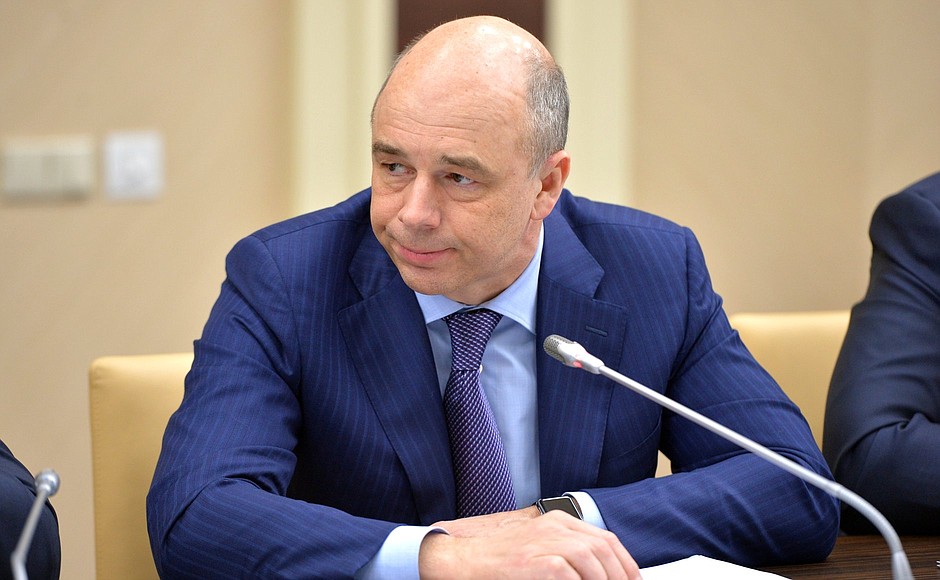
Vladimir Putin: As part of our sector-based import replacement plans, the Communications and Mass Media Ministry has drafted a concept document for the Russian Information Technology Development Fund. (Addressing Minister of Communications and Mass Media Nikolai Nikiforov) Could you say a few words, please, about these plans. A sum of five billion has been earmarked for this, isn’t that so?
Communications and Mass Media Minister Nikolai Nikiforov: Yes, that’s right, Mr President.
Vladimir Putin: How do you plan to use this money, what uses will it be put to?
Nikolai Nikiforov: Mr President, in 2015 you signed amendments to the Law on Information and Law on the Contract System of the Federal and Municipal Procurement. These amendments give us our first ever opportunity to identify with certainty the origin of software products used in Russia. We have established a special Russian software register. We put around 250 products on this list over the first six months, and we expect this figure to reach around 500.
The point of this work is that our software developers now have some advantages when it comes to software contracts from state municipal customers. Our data shows that state agencies alone buy foreign software products worth around 20 billion rubles a year, but we have software developers of our own with quality solutions to offer.
Data from sector-based associations shows that total exports from Russia in this sector, including IT services and software, reached a figure of nearly $7 billion. This is a substantial amount. Now, together with the Federal Anti-Monopoly Service, we will catch out the state customers who continue old habits and keep buying foreign software even though there are Russian-made solutions on the market. But in order to provide more systematic support for our own software developers, we proposed setting up the fund you mentioned.
We think we need to put in place four types of support instruments the sector is hoping to see. We drafted these proposals together with the IT industry. The first measure we propose is to partially subsidise the cost of developing system software. What do I mean here? This is the software at the foundation of everything else. It includes operating systems for our computers, servers and data processing centres, database management systems, and also the mobile operating systems that we find in the telephones or smartphones that tens of millions of our people possess.
The second support measure is preferential lending terms for IT companies. This measure has been quite effective in supporting industry, but the problem is that our IT specialists have practically no access to this kind of support because unlike people in industrial sectors, they have no assets to use as collateral and have no access to bank loans because essentially all they have is intellectual property.
The third measure is co-financing of part of the product promotion costs, including promotion abroad. This includes taking part in exhibitions, conferences, and other events.
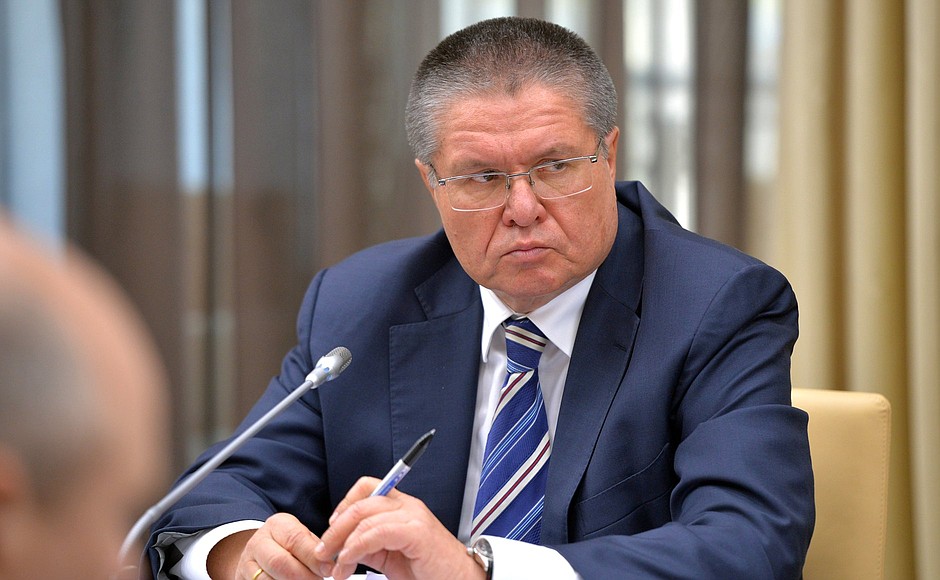
The fourth measure is the competence centre. This is a group of specialists permanently engaged in monitoring who is buying what. They monitor public sector customers and state-owned companies. They do this not so as to tell anyone off, but in order to spread best practice and give advice on how to go over to Russian products and end the yearly costs of paying for foreign software.
We have indeed found a financing source for this work in 2016, and have a total of 5 billion rubles. This is included in the sustainable economic development plan approved by the Prime Minister. The money comes from the payment that mobile telecommunications operators paid for the right to use some frequencies. This is the first time we have used such a practice.
The first frequency auctions were held in December and March, and this brought in nearly 15 billion rubles in additional revenue. This has already gone to the federal budget. This is where our money for 2016 is coming from. We will ask for this item to be kept in the draft budget proposals for 2017–2019, because, like in industry, it is long-term support that is needed, and we need more than one year. We will defend these proposals.
The last point concerns more specialised software, for the defence industry, for example, for our military, our nuclear sector, and our space sector. We are currently drafting proposals on establishing the institution of chief technologists or research directors. We plan to put this proposal before our defence industry colleagues for their examination. The industry is waiting for this.
We plan to take all the decisions rapidly, as the Prime Minister wishes. If we complete this work, we would be able to start getting this state support to the companies by May or June. The industry is really waiting for these decisions.
Vladimir Putin: This is all as far as state customers go, but what about state-owned companies, the big monopolies?
Nikolai Nikiforov: Yes, currently, these amendments directly concern Federal Law No. 44 on federal and municipal procurement. We think that this practice should be extended to Federal Law No. 223, which applies to companies in which the state has a stake. But this should be a gradual process. It would perhaps be best to introduce these amendments next year, once we have developed the register and put clear and transparent procedures in place. We have had a few differences arise, situations when decisions are contested in court, but we think this practice should be spread. The state-owned companies buy a much bigger quantity of software than do all of the state agencies.
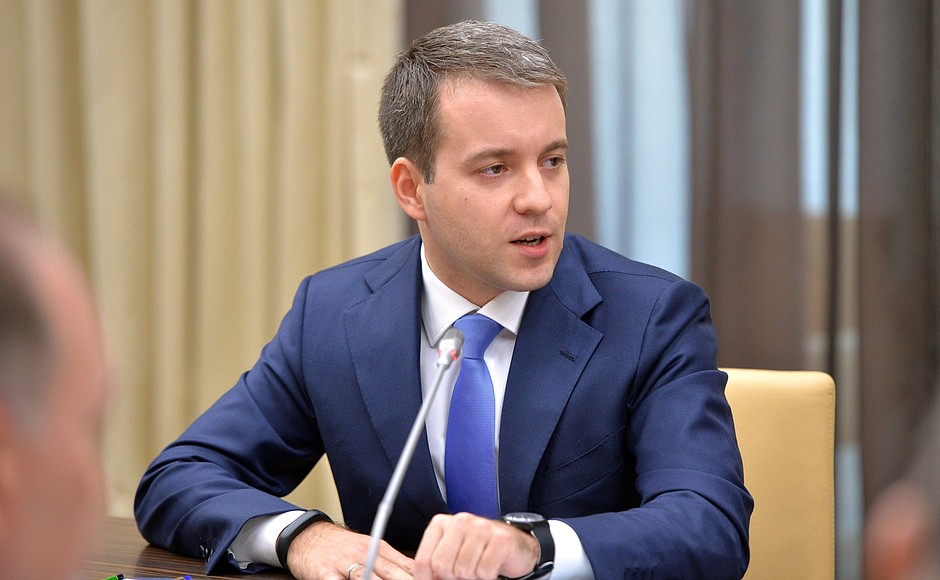
Vladimir Putin: How much did you say our exports in this area come to?
Nikolai Nikiforov: Up to $7 billion.
Vladimir Putin: So we export up to $7 billion. And how much do we sell inside Russia?
Nikolai Nikiforov: If you’re talking about state customers, we well around 20 billion rubles worth.
Vladimir Putin: Well, there you go.
Nikolai Nikiforov: And as for the state-owned companies, the figure is quite hard to estimate for sure.
Vladimir Putin: In other words, the people who produce these products, our national producers, have big potential. I therefore ask the Government to advise state representatives in state-owned companies to take these decisions as a guideline and perhaps as a recommendation in the first half of this year and start making the transition to Russian software in the second half of this year.
Nikolai Nikiforov: Thank you.
Vladimir Putin: Of course, we need to take into account this sector’s possibilities, but I am sure that it is up to the task of covering practically all of our software needs. This will require analysis, of course. We cannot just make decisions without first examining the situation, but it is very clear that we do need to start moving in this direction. There is no doubt that our programmers can provide us with everything we need. We just need to follow the whole process carefully. Work through this and make sure the heads of the state-owned companies understand the situation. At one of our later meetings I will ask you to brief me on the companies that have been informed and how the work is going.
First Deputy Prime Minister Igor Shuvalov: We will do this. The task is clear.
Vladimir Putin: I have a question on construction too. Last year, and in 2014, the construction sector produced good results and brought a lot of new housing onto the market. We are all aware of the current economic difficulties, and so, as I have said often at my meetings with regional heads, we need to help people to buy housing and give a boost to housing construction this year and beyond.
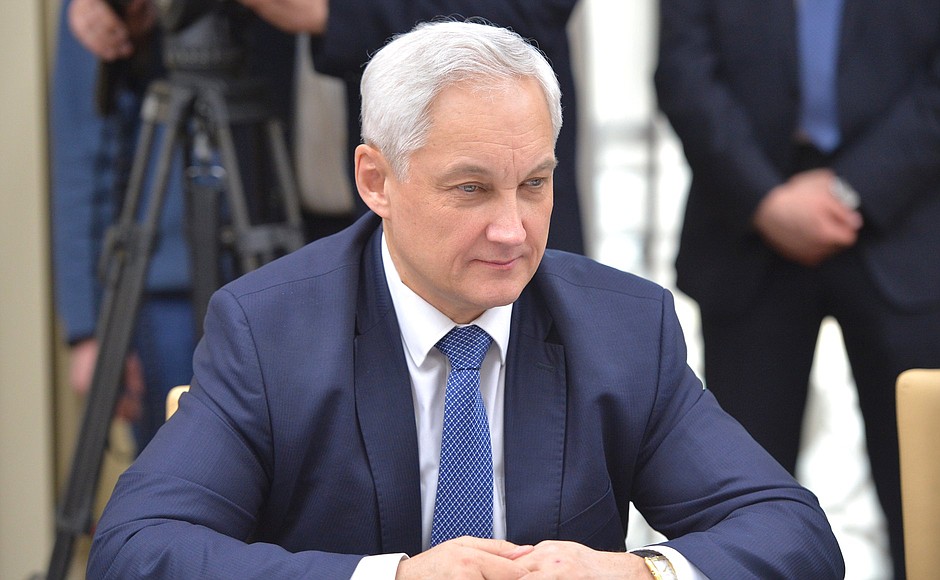
Since March last year, if I recall rightly, we have in place a programme for subsidising mortgage interest rates, and we have extended this programme this year and allocated around 16.5 billion, I think. (Addressing Minister of Construction, Housing and Utilities Mikhail Men) How is this programme working and what is the outlook for the upcoming period?
Minister of Construction, Housing and Utilities Mikhail Men: Mr President, colleagues,
We have received the latest updated statistics from Rosstat [Federal Statistics Agency] on last year’s results. A total of 85.3 million square metres were built nationwide. This is even more than in 2014, which was our record year. The figure is up 101.4 percent on 2014. There is no doubt that the subsidised interest rates played a big part in helping us to achieve this result.
Overall, 270,590 mortgage loans for a total of 484.7 billion rubles were accorded under this programme, and there was just over four billion rubles in investment from the federal budget. The programme has demonstrated its effectiveness: one in three apartments purchased on the primary market was bought through this programme.
Vladimir Putin: So, one in three apartment buyers made use of this service and took the subsidy?
Mikhail Men: Yes, they got the subsidy. In other words, the banks paid compensation later.
Based on the programme’s results, the Government decided to extend the programme. It is continuing practically unchanged. In other words, the maximum interest rate threshold is 12 percent. Banks can raise it in principle, and we see that competition is producing rates of 11.9 or 11.8. We will lower the margin slightly for the banks, but for people, the upper limit will remain at 12 percent. As you rightly noted, we have earmarked up to 16.5 billion rubles in the budget for supporting this programme. The programme will keep working through to January 1, 2017. We hope it will produce just as good an effect as in 2015.
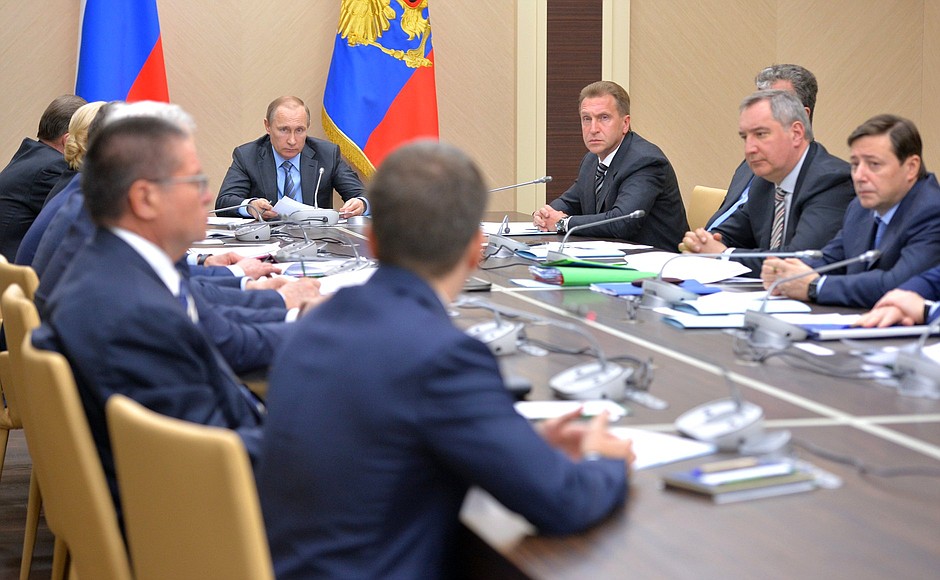
Vladimir Putin: What are the figures for the first quarter?
Mikhail Men: We do not have figures yet for the first quarter. We have figures for the first two months (January and February). A total of 10 million square metres came onto the market. This is a decrease of around 17 percent. But we had an increase in housing construction in the cheaper segment. Growth in this segment increased from 30.7 percent to 36.5 percent. The number of apartments in this segment has increased. Developers are moving into this particular sector. This was the main task you set us. Today, housing in this segment has increased by nearly 7 percent.
Vladimir Putin: Good. Thank you.
Mr Ulyukayev [Economic Development Minister], could you please brief us now on the laws concerning the business climate.
<…>
